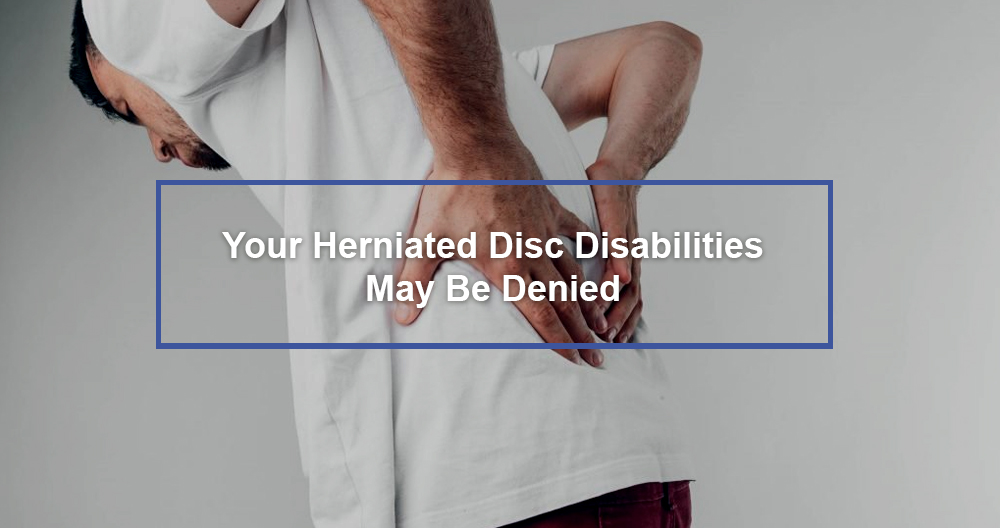
Herniated discs occur when the softened core of a spinal disc pushes against a crack within its casing. This disorder affects over 3 million Americans annually and can be quite severe. It can be difficult to obtain disability benefits due to this variance, especially when applying for the first time.
You should be cautious if you have been denied a herniated disc disability application. Continue reading to learn more about why your case was denied, and how you can start the next phase of the process.
Causes for Herniated Disc Denial
Blue Book doesn’t mention herniated discs by name. They may be covered under Section 1.04: Disorders of the Spine because of their potential eligibility for the comprehensive Section. The following are reasons your application for herniated disc may be denied:
- Absence of a compromised nerve root or spinal cord. No matter what condition you have, benefits may not be available for any spinal disorder that has a compromised nerve root or spinal cord. You can show this by MRI, CT, general x ray, motor function tests, or a physician’s physical exam. Your chances of being accepted are higher if you can show evidence that your back is in good condition.
- Evidence of spinal arachnoiditis and lumbar spine stenosis is not available. Even though nerve root compression by itself can still be a valid diagnosis, you may not be eligible for benefits if there are more specific diagnoses.
Spinal arachnoiditis (inflammation or inflammation of the arachnoid) requires a tissue sample, medical imaging and/or documentation. Lumbar spinalstenosis, or narrowing of the lower spinal canals, requires documentation of inflamed spine nerves and pain. Check with your doctor to confirm that you are at least one of these Blue Book listings to ensure you are eligible for benefits.
Is Herniated Disc a Permanent Disablement?
If your disc is severe, it can be considered disabled and you may be eligible for Social Security disability benefits. The Blue Book is an official list of all disabilities. Each listing in the Blue Book has a set requirements that an individual must fulfill to be eligible for benefits.
A herniated disc is usually not enough to be eligible for disability benefits. However, it must be expected that the injury will make the victim unable or unable to work for at least 12 consecutive months. It must also meet the criteria set forth in the Blue Book.
According to the Blue Book, to be eligible for disability benefits, a herniated spine must meet one of the following conditions:
- The nerve root is the first segment of nerve to leave the central nervous system.
- Distributed pain, limitation of spinal motion and/or motor impairment due to atrophying of unused muscle can cause widespread pain.
- Sensory or reflex loss, and limitation of motion in the legs as measured by a positive straight leg raising test (SLR).
If you have medical documentation, such as MRIs and X-rays, that can prove your herniated spine caused the condition, you may be eligible for Social Security disability benefits.
Qualifying with Medical Evidence
Most people who claim disability benefits are denied initially because they didn’t have enough medical documentation. A claim must be supported by medical documentation. All that is required for the Social Security Administration to approve a claim is medical documentation.
Your chances of approval are higher if you have more documentation. But you must provide the proper medical documentation. It is important to submit documentation such as a doctor’s diagnosis, a treatment program, and any other evidence that clearly demonstrates the nature of your disability.
People who apply for SSDI to cover a bulging or herniated spine are often rejected at the first attempt. To appeal, they must file an appeal. Only about 45 percent are successful in their hearings. A disability lawyer may increase your chances of winning at hearings.
Different types of Jobs That Herniated Discs Could Make Impossible
Herniated discs happen when the spinal canal is breached by the soft tissues. While medication may be effective in some cases, it is not always possible to treat all cases. Many people require physical therapy as well as surgery. A herniated disc can cause severe pain. Sometimes, even the most simple tasks can become unbearable and painful.
The motion of your back involves many different ranges of motion. Even if you can sit for most of the day, your back pain can be so severe that it makes working difficult.
For people with herniated discs it is difficult to work physically, both during and after the surgery. It is not possible to find work that allows you to work with herniated discs, especially in advanced cases.
Long-term effects of a herniated disc in the neck
Herniated discs can lead to serious health issues. Your herniated disc could cause long-term health problems if it is not treated. Untreated herniated discs could lead to paralysis or chronic long-term pain. For the treatment of a herniated disc in the neck, it is important to seek out all possible medical options. You should seek immediate medical attention if you have a herniated neck disc. If you’re a blue-collar worker, having this in your neck can make it difficult to perform your normal duties. A herniated disc in your neck can make it impossible to work. You might be eligible for Social Security disability benefits.
Social Security Disability Benefits
A herniated spine is one condition that qualifies for disability. A U.S. resident with a severe disorder can receive disability benefits.
- a) They cannot work or complete necessary daily tasks like bathing, dressing or moving around.
- b) Must last at least 12 month or be expected to cause death.
These people are eligible for monthly financial payments if they meet the criteria. These terms may require you to show different symptoms depending on your disorder. Each disorder’s requirements are listed in the Social Security Blue Book, which can be consulted on the SSA website at any moment.
A Herniated Disc Treatment
There are options for pain relief if you have a herniated or bulging disc. These treatments are recommended before you undergo surgery to repair your herniated disc. For pain relief, ice and heath treatment are recommended as the first option for treating a herniated spine. To treat a herniated disc, you can also use non-steroidal antiinflammatory drugs (NSAIDs), such as ibuprofen.
There are many medications that can be used to treat the pain of a herniated or bulging disc. These include narcotic pain medicines, oral steroids, epidural injections, and other pain medications. If you are still experiencing pain due to a herniated disc and medicine is not helping, physical therapy might be an option. Physical therapists can provide stretches and exercises to ease the pressure on the disc’s root.
You might consider surgery if medical treatment and physical therapy are not effective in relieving the pain caused by a herniated spinal disc. If your herniated disc is severe, you may consider decompression surgery.
If all other options have failed and your herniated disc remains severe enough that it is preventing you from working, you might be eligible to receive Social Security disability benefits.
Blue Book Listing of Herniated Discs
Herniated discs are listed in Section 1.04 of Blue Book, “Disorders of Spine ”, which is also called “herniated nocleus pulposus”.
A herniated disc can lead to several conditions, including nerve root compression (pressure on nerves), spinal stenosis and arachnoiditis. This is inflammation of the membrane surrounding the spine.
According to the Blue Book, applicants with a herniated spine can apply if their condition:
- The nerve root is the first segment of nerve to leave the central nervous system.
- Distributed pain, limitation of spinal motion and/or motor loss as a result of atrophying unused muscle can cause widespread pain.
- Causes sensory or reflex loss
- Limit motion in the legs if there is involvement in the lower back. This can be determined with a positive straight-leg lifting test (SLR).
If you just look at the listing it can be hard to see if you qualify. Understanding the Social Security Administration definition of a “compromised nervous root” or “limited back motion” can be challenging if you don’t understand it.
You may be able, however, to document your condition to support your disability claim if you are limited in movement, muscle weakness, reduced reflexes, or sensory responses due to a bulging or ruptured disc. Blue Book refers only to certain medical terms, so consult your doctor to confirm that you are eligible. To compare your results to the ones above, they can provide you with updated or new tests.
Rating of Herniated Disablement
A herniated disc can qualify you for Social Security Disability Insurance, (SSDI), as well as Veterans Administration (VA) benefits. A VA disability rating resulting from a herniated disc may allow you to get compensation. However, your VA rating won’t affect your SSDI claims unless the VA has granted you a 100% P & T. This means that you have been declared completely disabled as a result of your service-related disc injury.
For SSDI you must meet the criteria set forth in the Blue Book Listing. If your herniated disc is severe, you will qualify for SSDI. According to the listing, to be eligible to receive disability benefits, you must provide medical evidence showing that it has affected a nerve root, caused sensory or reflex loss, limited motion in the legs with a positive straight leg test, and caused distributed pain, spinal motion limitation, and/or motor loss due to atrophy of unused muscles.
Even if your herniated disc doesn’t meet the criteria for the listing, you may still qualify to receive disability benefits by combining all of your medical conditions and symptoms. You must show how they impact your ability to work and earn your living and how your ability to perform daily tasks has been affected. You will need hard evidence and supporting documentation in order to prove the severity of your condition.


